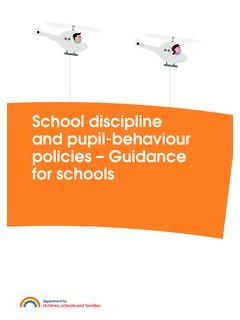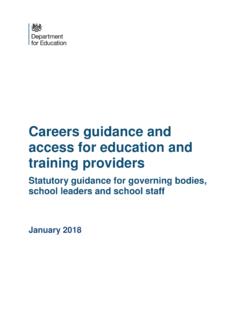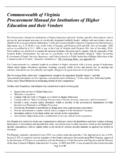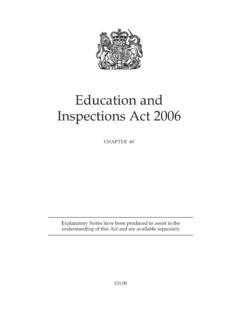Transcription of Governing the School of the Future - The Governor
1 Governing the Schoolof the FuturePageForeword by Derek Twigg2 The Government s Ambitions for our Schools3 The role and contribution of Governing Bodies5 Governance and School Leadership5 Membership of the Governing Body7 The Challenge8 Governor support and training9 Future Developments on Support and Training10 Investment in Governing Body Training and Support 10 Role of the Chair11 Governor recruitment and profile raising13 Support for Governor Recruitment13 The School Governors One-Stop Shop (SGOSS)14 Raising the Profile of School Governorship14 Conclusion16 Annex A: Further information17 Annex B: Categories of Governor19 Endorsements201 List of contentsThe aim of the Government is to ensure that all children have the best possibleeducation, tailored to their needs, interests and aptitudes. Governing bodiesare central to achieving this aim, and this document Governing the Schoolof the Future looks at the role of the Governing body in the early 21st Century,celebrates the many achievements of our system of governance, and looksahead to the challenges and opportunities for the Future .
2 Governing the School of the Futureis essentially a document for schoolgovernors and potential School governors. But I hope it will also be of interestto employers. Employers who actively support their staff to serve as governorsknow that by doing so they are making an excellent investment in thedevelopment of their workforce and in the Future of the community. I hope that more and more employerswill be encouraged to follow the examples in this role of the Governing body has changed beyond recognition over the past twenty years. With theintroduction of local management of schools and further reforms, Governing bodies have become thestrategic leaders of schools. They are rightly responsible and accountable in law and in practice for majordecisions about the School and its Future . Governing bodies are equal partners in leadership with the headteacher and senior management team.
3 We want to see them taking a full part in driving the improvementand culture of the School . I welcome the fact that LEA governors are increasingly appointed because ofthe contribution they can make to the School and not on the basis of political affiliation. The time is now right to celebrate the contribution and achievements of School governors and to explorewhat Government and others need to do to support Governing bodies to meet the challenges of the personally welcome the work that School governors contribute towards our education system and Irecognise the huge debt owed to governors. I have been a Governor myself at several schools, including aperiod as Chair of Governors at The Bankfield School , and I continue to be impressed by their enthusiasmand dedication. As the Minister with responsibility for School governance I am looking forward to meetinggovernors at schools and conferences and in other also pay tribute to the work that national and local organisations do to support School national Governor associations, Coordinators of Governor Services, diocesan bodies and the SchoolGovernors One-Stop Shop all contribute to ensuring the effectiveness of Governing bodies across thecountry.
4 All have an important role to play in the Future development of our schools and their TWIGGP arliamentary Under Secretary of State for Schools2 Foreword3 The Government s Ambitions for our funding and reforms we have introduced to the education system since 1997 have made adifference. The number of teachers is at its highest level since 1981 and the proportion of schoolswith good or better leadership and management has risen to around three-quarters, as compared toaround half in 1997/98. ICT is transforming education with over 99% of schools in Englandconnected to the Internet. We now have an education system that is amongst the best in the to 1998 about 84,000 more 11 year olds at the end of their primary schooling areachieving the expected level for their age in maths and around 60,000 more are doing so in the secondary phase 14 year olds are performing better than ever before in English, maths andscience; and 53 percent of 16 year olds are now achieving five or more GCSEs at grades A*-C,compared with 45 percent in 1997.
5 Should celebrate these achievements they are down to the hard work of teachers,headteachers, support staff, pupils, and governors. But there is much to do and this is not the timeto be complacent. The Government s recent Five Year Strategy for Children and Learners1sets out avision for a radically reshaped system for delivering education and children s services. For schoolsthere are two central aspirations: all pupils to benefit from personalised learning that is, a broad and balanced curriculum andextra-curricular learning that suits them, builds on what they know, takes account of their needs,allows them to have a say about their learning, and helps them to reach their full potential; all schools increasingly to drive their own improvement, enjoying more autonomy and freedomwhile being properly accountable for the services they provide and cooperating with otherschools and providers of other services to drive system-wide order to support schools and improve outcomes for children and young people, the Governmentis committed to bringing together all those who provide services for children and families in eachlocal area.
6 These changes, which are set out in more detail in Every Child Matters: Change forChildren2(and in subsequent documents), will provide unprecedented opportunities for newways of working and for closer collaboration between schools and other service providers. learning means tailoring education to individual needs so as to fulfil every pupil spotential. This is not a new initiative many schools have tailored their curriculum and teachingmethods to meet pupil needs with great success for many years. We want to help all schools andteachers establish their own approaches to personalised learning, so that across the educationsystem the learning needs and talents of children and young people are used to guide decision-making. We would like schools and School Governing bodies to join a national conversation abouthow personalised learning can be used to drive success in every at: at: information on personalised learning is available at: agenda set out in the Five Year Strategyis challenging, but offers real and exciting opportunitiesfor flexibility in the system for schools to will be guaranteed three yearbudgets for every School from 20064, so that Governing bodies and headteachers haveunprecedented financial security and confidence to plan for the Future .
7 Every secondary schoolwill be able to become a specialist School with a mission to build a centre of curriculumexcellence and specialist schools will be able to take on a second specialism to develop theirmission between schools and other will increasingly work with otherpartners, including private, voluntary and community sector providers and health and social careservices, to determine how best to meet the needs of children, the School and the community, aspart of the Every Child Matters agenda. Schools will also be able to form FoundationPartnerships, which will enable groups of schools to raise standards and to work together to takeon wider responsibilities for the pupils within their local community. intelligent accountability New Relationship with Schools5will cut red tapeand thus make it easier for Governing bodies to play their key role in accountability, a role thatincludes responsibility for the School s performance management policy and for managing theheadteacher s performance.
8 The inspection burden on schools will be halved and there will besimpler data and information systems, making sure schools are not asked again and again for thesame information. A School profile6will give quality information about the breadth and depth ofthe School s performance and ambitions. schools will be encouraged to become extended schools7, offering a wide range ofservices for pupils, families and the community, in partnership with other service providers. TheFive Year Strategysets out a core offer of extended services for each phase that we expect tosee developing in schools over time. For the primary phase these services are a broad range ofstudy support/enrichment activities before and after School , parenting support, swift referralsystems to multi-agency support as well as the growth of 8am-6pm, year round childcareopportunities. For the secondary phase, the offer is similar but with more scope for schools toprovide community access to sports, arts and ICT facilities, for co-location of multi-agency teamsand to provide a wide range of things for young people to do.
9 Provision will often be developed inpartnership with other services and the voluntary and community sectors. Governing bodies willplay a key role in supporting the development of these services and will often find themselvesworking with a broad range of partners to deliver improved outcomes for children. the vision for schools will depend on strong Governing bodies8responsible andaccountable for strategic decisions about schools and their Future . The Five Year Strategysets outproposals for giving Governing bodies more freedom and support to develop schools to meet theneeds of pupils, parents and the wider community. Governing bodies will therefore need to have astrong and varied membership, with the energy and capacity to make the most of the opportunitiesavailable to schools. We need to make sure that all our schools, particularly those that are strugglingto improve, are served by governors who can rise to the challenges set out in the Five Year Strategy.
10 44 More information on School funding is available at: 5 More information on the New Relationship with Schools is at: Some ofthe proposals may require legislative information on the School profile is available at: information on extended schools is available at: to schools and Governing bodies in this document apply to maintained schools and their governingbodies only (and not to Academies and independent schools).Governance and School Governing body, headteacher and senior management team together constitute the leadershipteam of the School . Good headteachers recognise the importance of challenge and support fromtheir Governing bodies especially at a time when managing change has become a key role for allheadteachers. great number of schools already have many of the characteristics we want for every School :specialism for secondary schools, an ethos of success and community responsibility, and autonomyand freedom for governors and heads to lead their schools and develop provision to meet the needsof their pupils.







